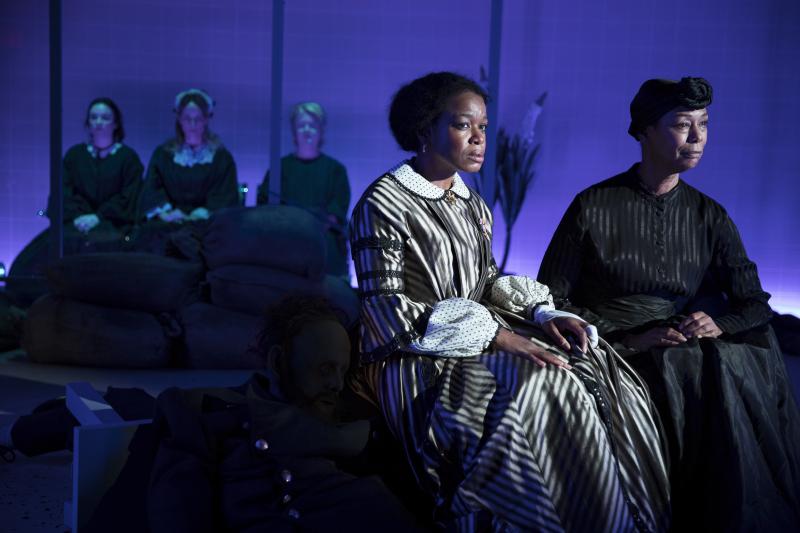Review: Jackie Sibblies Drury's MARYS SEACOLE Honors a Pioneering Nurse and Those Who Carry On Her Legacy
Over 160 years after she first gained fame tending to wounded British soldiers during the Crimean War, the name Florence Nightingale is still recognized as a symbol of selfless caregiving and she is often regarded as the founder of modern nursing.

Quincy Tyler Bernstine and Karen Kandel
(Photo: Julieta Cervantes)
But there was another woman who was just as beloved by soldiers for her bravery and leadership during that conflict. And though the name Mary Seacole has drifted into obscurity among Americans, she is still revered by the British as a pioneer in nursing.
The daughter of a Scotsman in the British army and a Jamaican healer who treated with herbal remedies, Seacole was born in Kingston and grew up learning her mother's practice.
Rejected by the War Office when she applied to serve, she traveled to the front lines herself and set up quarters to treat the wounded.
And though her name is honored by playwright Jackie Sibblies Drury in her premiere production by LCT3 at Lincoln Center's Claire Tow Theater, the title Marys Seacole gives a nod to all women of color who have contributed to the nursing and caregiving professions.
As played by Quincy Tyler Bernstine, Mary Seacole is first seen as what might be taken as a representation of the statue of her that was erected outside of London's St. Thomas' Hospital less than three years ago, stiffly posed in designer Kaye Voyce's crinoline gown and pouring out autobiographical facts.
Behind her, the Pepto-Bismol pink walls of designer Mariana Sanchez's set help place the action in a contemporary hospital. An elderly white woman (Marceline Hugot) lies in bed while her daughter (Lucy Taylor) belligerently demands more help from the staff and her bored granddaughter (Ismenia Mendes) begrudgingly waits.
.jpg)
(Photo: Julieta Cervantes)
Bernstine is now a present-day nurse handling the situation along with her colleague (Gabby Beans). This includes a very realistic-looking depiction of changing the patient's soiled bedding.
The women will play multiple roles in director Lileana Blain-Cruz's production (including Taylor as a condescending Florence Nightingale), which emphasizes the kaleidoscopic nature of the playwright's storytelling as it leaps back and forth through time and Marys. Overseeing the proceedings is the spiritual image of Duppy Mary (Karen Kandel), named for a term out of Jamaican folklore, sometimes appearing as Mary Seacole's mother.
So a hospital training session to prepare for the possibility of a mass shooting contrasts with a scene of battlefield carnage. (Mannequins provide the play's only male presence.) The sacrifices of the 19th Century women of color parallel those of their modern compatriots who care for white children and white elderly in order to support their own families.
The 90-minute piece tends to be more stylized than dramatically effective (the use of Whitney Houston's recording of Chaka Khan's anthem "I'm Every Woman" gets its point across more effectively than the use of Harry Belafonte's recording of "The Banana Boat Song") but Drury convincingly makes her point about the short shrift Mary Seacole has been handed by history, as well of the lack of appreciation for those who carry on her legacy.
Reader Reviews




